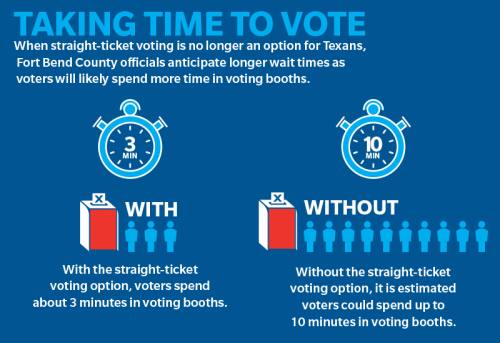As the population continues to grow and 14-year old voting machines are becoming too old, Fort Bend County officials are looking to local legislators to fund updated infrastructure as straight-ticket voting is phased out in the state.
Effective in 2020, straight-ticket voting—an option that allows voters to select every candidate from one political party with one click—will no longer be available for Texans due to the passage of House Bill 25 during the 85th legislative session in 2017.
Oldham also said he agrees the loss of the straight-ticket option will result in longer lines. About 70 percent of voters in the county initially selected the straight-ticket option during the last presidential election, he said.
Nearly 260,000 residents voted in the Nov. 2 general and special election in Fort Bend County, resulting in a voter turnout of about 60 percent, according to the county elections office. With a presidential election coming up in 2020 that is expected to yield high turnout, Fort Bend County Judge KP George said he worries time spent in voting booths could increase by seven minutes for individual voters without the option.
“It is a serious matter, and we are aware of it,” George said. “I’m hoping the state Legislature this time around comes up with some solution because it’s not just a Fort Bend-only issue.”
The average Fort Bend County voter spends one to three minutes at a voting machine with a straight-ticket voting option, George said. He anticipates voters will spend anywhere from seven to 10 minutes at the machines without this option.
“I’m very concerned about how we are going to manage that especially with these older machines,” George said.
County Elections Administrator John Oldham said he has noticed technical problems with the voting machines in the last two years. Although the issues do not result in lost votes, the machines are taken out of service for as long as is takes to perform maintenance.
Oldham said the county will need several hundred more machines to accommodate not only doing away with straight-ticket voting but also the growing population in Fort Bend County.
An additional necessity will be more sites for early voting, he said.
The county would need about $12 million to replace its roughly 1,350 voting machines. Officials are relying on legislation such as HB 362, authored by Rep. Celia Israel, D-Austin, that would create a fund to assist local governments with the acquisition of voting system equipment.
Rep. Ron Reynolds, D-Missouri City, along with state Sen. Borris Miles, D-Missouri City, have filed HB 740 and Senate Bill 359, respectively, that would repeal HB 25 entirely. Reynolds said he voted against HB 25 because of feedback suggesting the elimination of straight-ticket voting would become a disadvantage for minority citizens.
“The length of the ballot can be an impediment for some voters that are accustomed to being able to cast a one-punch, straight-ticket ballot,” Reynolds said in an email. “Most of the local and judicial offices are at the very end of the ballot and I’m concerned that this will lead to a large number of under votes especially for minority voters.”
George said he felt the straight-ticket option presented some benefits but is bracing for the elimination of the option for the 2020 elections. Both George and Reynolds said they agree the elimination of the option will result in longer wait times in large counties such as Fort Bend.
“I fully support Fort Bend County’s request for more funding for voting machines,” Reynolds said. “In fact, I have been working with County Judge KP George to get additional funding from the state to replace some of the older voting machines. I’m optimistic that we can accomplish this goal, but it will be challenging because of all the other legislative priorities that are requesting funding.”






